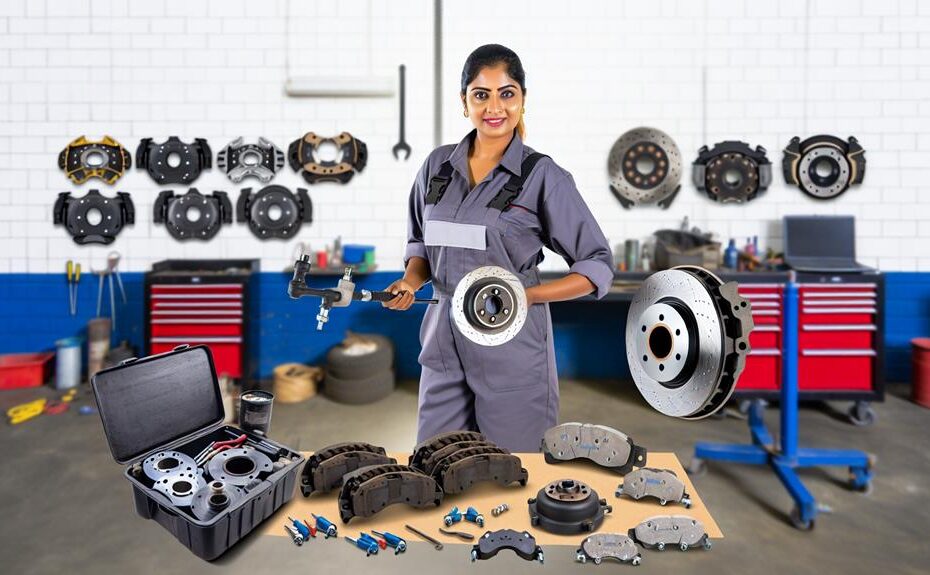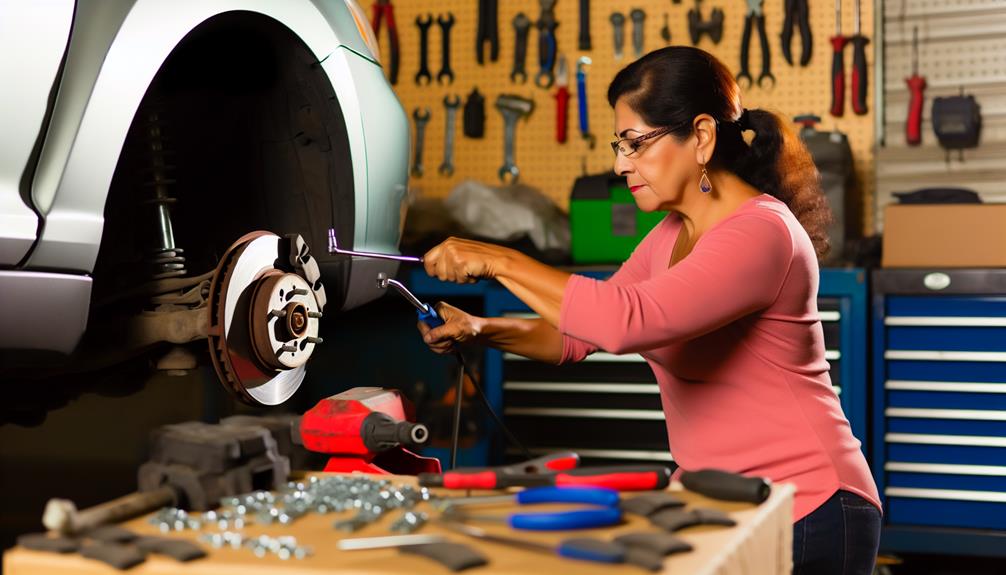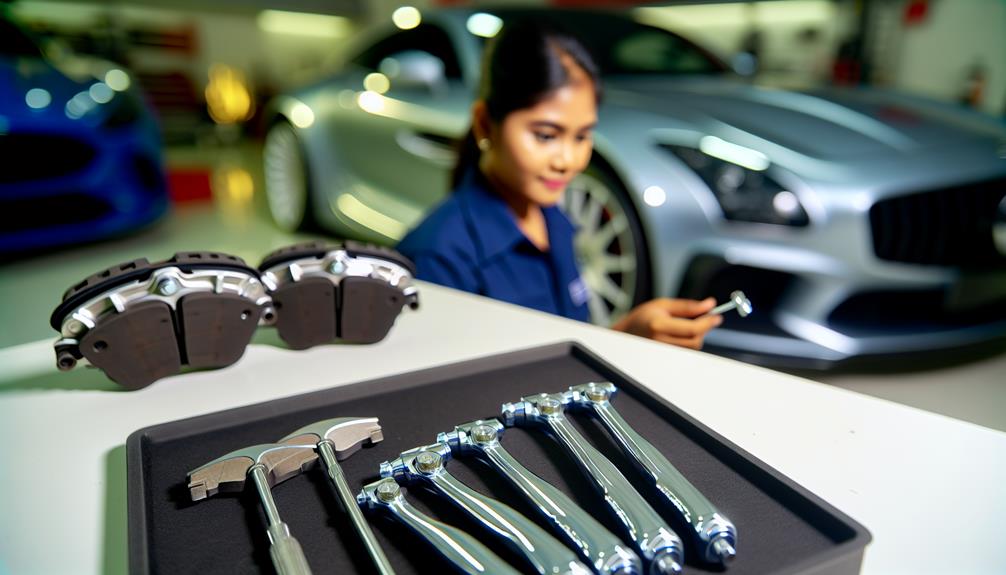So you're an off-road enthusiast, tearing up the trails in your trusty 4×4 vehicle. You know that with all the rough terrain and intense driving, your brakes can take a beating. That's why it's crucial to have the best brake repair options available to ensure your safety and performance.
In this discussion, we will explore six top-notch solutions that will keep your off-road beast stopping on a dime. From OEM brake parts to performance upgrades and specialized off-road brake kits, we've got you covered.
So buckle up and get ready to discover the ultimate brake repair options for your adventure machine.
Key Takeaways
- Opting for OEM brake parts ensures optimal performance and reliability for off-road and 4×4 vehicles.
- Upgrading with aftermarket brake pads and brake rotor upgrades can improve braking performance in demanding off-road conditions.
- Regular brake caliper rebuilds and brake fluid flush and replacement are crucial for maintaining the safety and efficiency of the braking system.
- Signs of brake fluid degradation and damage caused by contaminated brake fluid include longer stopping distances, loss of braking power, and corrosion of brake lines. Regular brake fluid flushes and replacements can prevent these issues and ensure optimal braking performance.
OEM Brake Parts
When it comes to brake repairs for off-road and 4×4 vehicles, opting for OEM brake parts is a wise choice to ensure optimal performance and reliability. While aftermarket brake parts may offer a variety of options, custom brake pads and aftermarket brake rotors, for instance, they may not always meet the same quality standards as OEM parts.
OEM, or Original Equipment Manufacturer, brake parts are specifically designed by the vehicle manufacturer for your off-road or 4×4 vehicle. They're built to the exact specifications and standards required for your vehicle, ensuring a perfect fit and compatibility. This precision engineering guarantees that the brakes will function as intended, providing efficient stopping power and maintaining the vehicle's reliability.
Custom brake pads, on the other hand, may offer different materials and performance characteristics, but they may not have undergone the same rigorous testing as OEM parts. Aftermarket brake rotors may vary in quality, leading to potential issues such as vibrations, decreased stopping power, or premature wear.
Performance Brake Upgrades
For improved braking performance, consider upgrading your off-road or 4×4 vehicle with performance brake components. By investing in aftermarket brake pads and brake rotor upgrades, you can enhance the stopping power and overall efficiency of your vehicle's braking system. These upgrades are designed to withstand the demanding conditions and heavy loads that off-road and 4×4 vehicles often encounter.
To help you make an informed decision, below is a table showcasing some popular performance brake upgrades available in the market:
| Performance Brake Components | Features | Benefits |
| —————————- | ——– | ——– |
| Aftermarket Brake Pads | – Enhanced friction material
- Reduced fade
- Improved heat dissipation | – Increased stopping power
- Consistent performance under extreme conditions
- Longer lifespan |
| Brake Rotor Upgrades | – Slotted or drilled design
- High-quality materials
- Improved heat dissipation | – Enhanced braking performance
- Reduced brake fade and overheating
- Minimized rotor warping |
When selecting aftermarket brake pads, look for options that provide increased friction and heat dissipation capabilities. This will ensure optimal braking performance even during intense off-roading adventures. Brake rotor upgrades with slotted or drilled designs offer improved cooling and prevent the buildup of brake dust and gas, resulting in consistent performance and prolonged rotor life.
Upgrading your off-road or 4×4 vehicle's brake components to high-performance options will provide you with the confidence and reliability you need while conquering challenging terrains. Remember to consult with a professional to determine the best options for your specific vehicle model and driving needs.
Off-Road Brake Kits
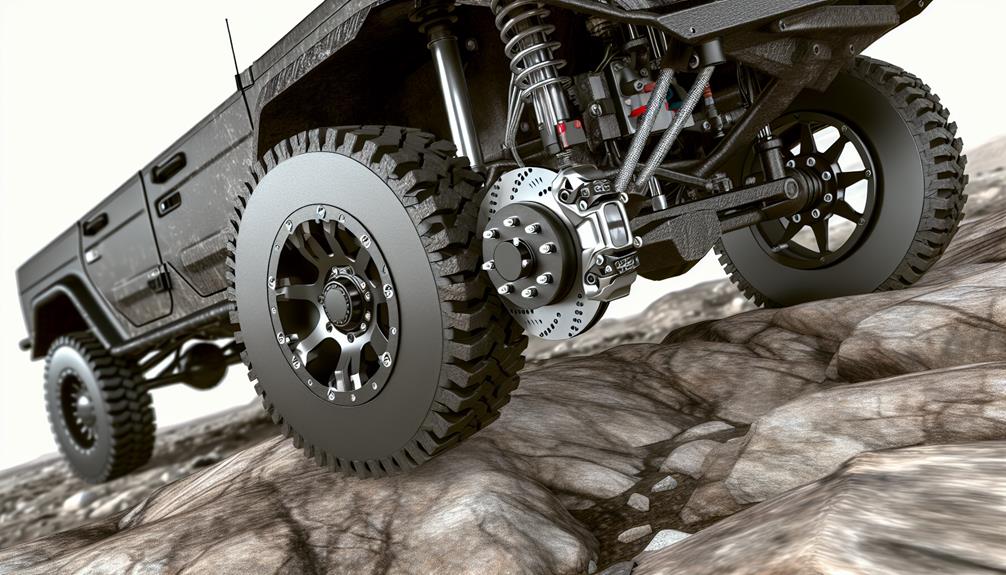
When it comes to off-road brake kits, you can expect enhanced stopping power, durability, and reliability.
These kits are specifically designed to handle the demanding conditions of off-road driving, providing you with the confidence to navigate challenging terrains.
With their advanced features and components, off-road brake kits are a crucial upgrade to ensure your vehicle can safely stop in any off-road situation.
Enhanced Stopping Power
To enhance the stopping power of your off-road or 4×4 vehicle, consider investing in an off-road brake kit. These kits are specifically designed to improve braking performance in rugged terrain and demanding conditions.
One key component of an off-road brake kit is the upgraded brake pads. These pads are made from high-quality materials that provide better friction and heat dissipation, resulting in improved stopping power.
Additionally, off-road brake kits often include brake rotor replacements. These rotors are designed to withstand the intense heat and stress that off-road driving can put on the braking system.
Durability and Reliability
Consider the durability and reliability of off-road brake kits to ensure optimal performance in rugged terrains and demanding conditions. When choosing an off-road brake kit, keep in mind the following factors that contribute to durability and reliability:
- Rust Prevention: Off-road vehicles are constantly exposed to moisture, mud, and other corrosive elements. Look for brake kits that feature rust-resistant materials and coatings to prevent deterioration and ensure long-lasting performance.
- Heat Dissipation: Off-road driving puts a significant strain on your brakes, resulting in increased heat generation. High-quality brake kits are designed to dissipate heat effectively, preventing brake fade and maintaining consistent stopping power.
- Robust Construction: Off-road brake kits should be built to withstand the rigors of off-road driving. Look for components made from durable materials such as cast iron or stainless steel to ensure longevity and reliability.
- Sealed Components: Off-road brake kits should feature sealed components to protect against dirt, debris, and moisture. This helps maintain optimal performance and extends the lifespan of your brakes.
Brake Caliper Rebuilds
If your off-road or 4×4 vehicle's brake calipers are showing signs of wear or malfunction, it may be necessary to rebuild them for optimal performance. Brake caliper maintenance is crucial to ensure the safety and efficiency of your vehicle's braking system. Rebuilding the brake calipers involves disassembling, inspecting, cleaning, and replacing worn or damaged components. This process helps restore the calipers to their original condition, improving their functionality and extending their lifespan.
When should you consider a brake caliper rebuild? If you notice any of the following signs, it's time to take action: uneven braking, excessive brake pedal travel, squealing or grinding noises, or a soft or spongy brake pedal. These issues can be indicative of worn caliper pistons, seized or sticking caliper slides, or damaged seals.
While brake caliper maintenance is essential, there may be instances where a rebuild isn't enough. In cases of severe damage or excessive wear, brake caliper replacement might be necessary. Effective brake calipers are critical for off-road and 4×4 vehicles, as they provide the necessary stopping power for navigating rugged terrains and steep inclines.
Brake Fluid Flush and Replacement
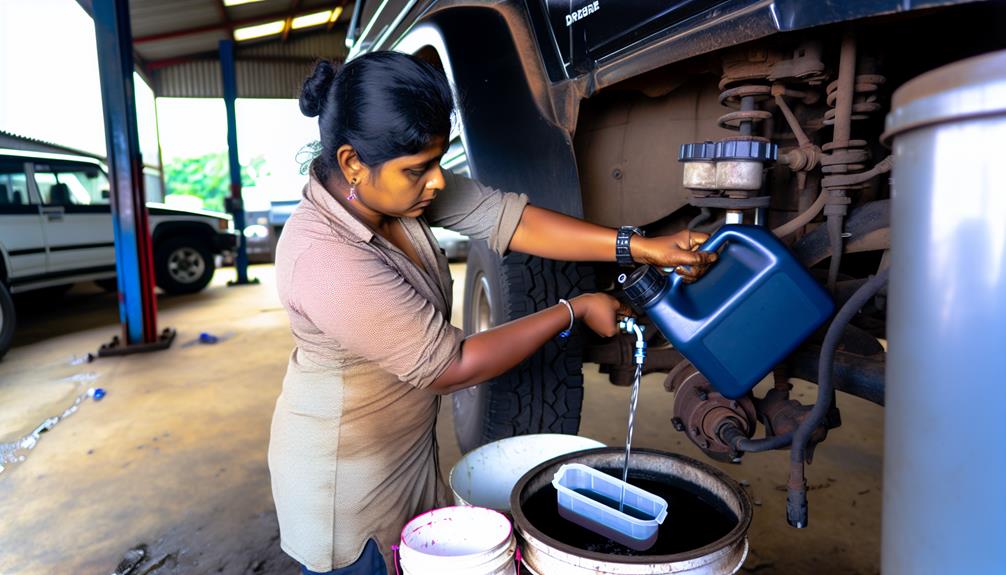
When maintaining the brake system of your off-road or 4×4 vehicle, one crucial aspect to consider is the regular flushing and replacement of the brake fluid. Brake fluid is a vital component of the braking system, as it transfers the force from the brake pedal to the brake pads, allowing your vehicle to come to a stop. Over time, brake fluid can become contaminated and degrade, leading to decreased braking performance and potential safety hazards.
Here are some signs of brake fluid degradation and reasons why a brake fluid flush and replacement is necessary:
- Brake fluid contamination: Brake fluid can become contaminated with moisture, dirt, and debris over time, which can affect its performance and compromise the braking system.
- Decreased braking performance: If you notice a spongy or soft brake pedal, longer stopping distances, or a loss of braking power, it could be a sign of degraded brake fluid.
- Corrosion and damage: Contaminated brake fluid can cause corrosion and damage to the brake lines, calipers, and other components of the braking system, leading to costly repairs.
- Safety concerns: Regular brake fluid flushes and replacements help maintain optimal braking performance, ensuring your safety and the safety of others on the road.
To prevent brake fluid degradation and maintain the effectiveness of your braking system, it's recommended to have your brake fluid flushed and replaced every 2-3 years or as specified by your vehicle's manufacturer. Consult a professional mechanic to perform this essential maintenance task and keep your off-road or 4×4 vehicle in top condition.
Brake System Inspection and Maintenance
After completing a brake fluid flush and replacement, the next important step in maintaining the brake system of your off-road or 4×4 vehicle is conducting regular brake system inspection and maintenance.
Brake system troubleshooting involves checking various components for wear and tear, ensuring they're in proper working condition.
Start by inspecting the brake pads. Check for any signs of uneven wear, such as one pad being thinner than the other. If you notice uneven wear, it might indicate a problem with the brake caliper or a misalignment issue. In such cases, you may need to replace the brake pads and address the underlying issue.
Next, examine the brake rotors for any signs of warping, cracking, or grooving. If you notice any abnormalities, replacing the rotors may be necessary.
Additionally, inspect the brake lines and hoses for any signs of leaks or damage. It's crucial to ensure that the brake fluid level is adequate and that there are no contaminants present.
Regular brake system inspection and maintenance will help identify potential problems early on, allowing you to address them promptly and ensure the optimal performance and safety of your off-road or 4×4 vehicle.
Frequently Asked Questions
Are OEM Brake Parts the Best Option for Off-Road and 4×4 Vehicles?
Using aftermarket brake options for off-road and 4×4 vehicles has its pros and cons. However, are OEM brake parts the best option? Let's explore the benefits and drawbacks of using them in this specific context.
Can Performance Brake Upgrades Improve the Braking Performance of Off-Road and 4×4 Vehicles?
Performance brake upgrades are a viable option for improving the braking performance of your off-road and 4×4 vehicles. Aftermarket brake options offer enhanced stopping power and durability, providing you with the liberation you desire on your rugged adventures.
What Are the Benefits of Using Off-Road Brake Kits in Off-Road and 4×4 Vehicles?
Using off-road brake kits in your off-road and 4×4 vehicles provides numerous benefits. Ceramic brake pads offer better performance, reducing brake fade and improving stopping power. Larger brake rotors enhance braking performance, ensuring better control and safety on rugged terrains.
When Should Brake Calipers Be Rebuilt in Off-Road and 4×4 Vehicles?
If you notice signs of brake caliper failure in your off-road or 4×4 vehicle, it may be time to consider rebuilding or replacing them. Remanufactured calipers can provide a cost-effective and reliable solution for your braking needs.
How Often Should Brake Fluid Be Flushed and Replaced in Off-Road and 4×4 Vehicles?
You should flush and replace your brake fluid every 2 years or 30,000 miles in off-road and 4×4 vehicles. Neglected brake fluid can cause performance issues and compromise your vehicle's ability to handle off-road conditions.
Conclusion
In conclusion, when it comes to brake repair for off-road and 4×4 vehicles, there are various options available.
Whether you choose OEM brake parts, performance upgrades, off-road brake kits, caliper rebuilds, fluid flush and replacement, or regular inspection and maintenance, it's crucial to ensure the safety and efficiency of your braking system.
Remember, taking the brakes for a test drive is like putting the pedal to the metal – it's essential for a smooth and controlled ride.
